Principal Investigators
Katrin Iken, Ph.D.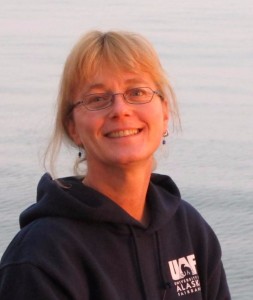
Dr. Katrin Iken is the lead investigator of the AMBON project and is a benthic ecologist with particular interest in the Arctic ecosystem. She studies benthic community structure with focus on the biodiversity and structure of epibenthic communities, i.e., the organisms that live on the surface of the seafloor. She also studies food web structures through stable isotope analysis. Katrin has been working in the Arctic for 15 years, with significant time spent in the field in the summers; previous to her Arctic work, she was mostly engaged in Antarctic research. Aside from several other Arctic research projects, Katrin also is active in the international Circumpolar Biodiversity Monitoring Program of CAFF (Conservation of Arctic Flora and Fauna, an Arctic Council Working group) as the US benthic expert member. Katrin received her PhD at the Alfred Wegner Institute for Polar and Marine Research (AWI) in Germany and did post-doctoral work at the AWI and the University of Alabama at Birmingham before starting a faculty position at the University of Alaska Fairbanks.
Bodil Bluhm, Ph.D.
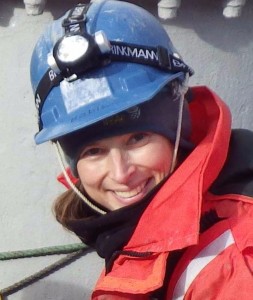 Dr. Bodil Bluhm is Affiliate Faculty with the School of Fisheries and Ocean Sciences at the University of Alaska Fairbanks and a Professor at UiT – the Arctic University of Norway. She holds a MS degree in zoology from Kiel University and a PhD in marine biology from University of Bremen (both in Germany). Her research is on benthic and sea ice-related habitats in polar areas with a focus on biodiversity and community ecology, foods webs, cryo-pelagic-benthic coupling and invertebrate population dynamics. She has worked in the Pacific and Atlantic Arctic for nearly 2o years and has a strong interest in regional and pan-Arctic integration. Within AMBON, she contributes to the benthic component.
Dr. Bodil Bluhm is Affiliate Faculty with the School of Fisheries and Ocean Sciences at the University of Alaska Fairbanks and a Professor at UiT – the Arctic University of Norway. She holds a MS degree in zoology from Kiel University and a PhD in marine biology from University of Bremen (both in Germany). Her research is on benthic and sea ice-related habitats in polar areas with a focus on biodiversity and community ecology, foods webs, cryo-pelagic-benthic coupling and invertebrate population dynamics. She has worked in the Pacific and Atlantic Arctic for nearly 2o years and has a strong interest in regional and pan-Arctic integration. Within AMBON, she contributes to the benthic component.
Rob Bochenek
 Rob Bochenek has been developing data management and cyber infrastructure solutions for research programs and organizations for the past fifteen years. He is a graduate of the University of Michigan with a degrees in aerospace engineering and mathematics. Early in his career Rob spent five years at the Exxon Valdez Oil Spill Trustee Council leading the data management team in processing, documenting and organizing the informational products produced from the scientific research funded to understand and monitor the ecological effects of the oil spill. Based upon that experience, Rob founded Axiom in 2006 to develop more generalized and holistic solutions for data management. He specializes in scientific geospatial information management with applications to physical/biological modeling and decision support data warehouse knowledge systems.
Rob Bochenek has been developing data management and cyber infrastructure solutions for research programs and organizations for the past fifteen years. He is a graduate of the University of Michigan with a degrees in aerospace engineering and mathematics. Early in his career Rob spent five years at the Exxon Valdez Oil Spill Trustee Council leading the data management team in processing, documenting and organizing the informational products produced from the scientific research funded to understand and monitor the ecological effects of the oil spill. Based upon that experience, Rob founded Axiom in 2006 to develop more generalized and holistic solutions for data management. He specializes in scientific geospatial information management with applications to physical/biological modeling and decision support data warehouse knowledge systems.
Eric Collins, Ph.D.
Dr. Eric Collins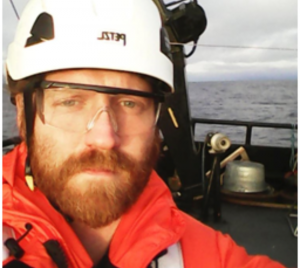 is Assistant Professor of Biological Oceanography at the University of Alaska Fairbanks’ Institute of Marine Science. Depending on who is asking, he alternately describes himself as a ‘biological oceanographer’, ‘marine microbiologist’, ‘microbial ecologist’, ‘molecular ecologist’, ‘bioinformatician’, or ‘astrobiologist’. Eric is involved in several projects linking the diversity and distribution of microorganisms with their evolutionary histories as seen through the lens of genomics. With a particular interest in extreme environments, Eric has traveled north of the Arctic Circle in 6 different countries, including on a 550km ski traverse of the Greenland ice sheet in 2014.
is Assistant Professor of Biological Oceanography at the University of Alaska Fairbanks’ Institute of Marine Science. Depending on who is asking, he alternately describes himself as a ‘biological oceanographer’, ‘marine microbiologist’, ‘microbial ecologist’, ‘molecular ecologist’, ‘bioinformatician’, or ‘astrobiologist’. Eric is involved in several projects linking the diversity and distribution of microorganisms with their evolutionary histories as seen through the lens of genomics. With a particular interest in extreme environments, Eric has traveled north of the Arctic Circle in 6 different countries, including on a 550km ski traverse of the Greenland ice sheet in 2014.
Lee Cooper, Ph.D.
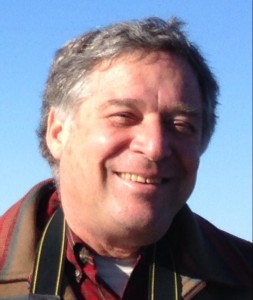 Dr. Lee Cooper is a Research Professor at the Chesapeake Biological Laboratory of the University of Maryland Center for Environmental Science. He received his Ph.D. in Oceanography from the University of Alaska Fairbanks in 1987 following undergraduate and graduate work at the University of California, Santa Cruz and the University of Washington. Prior to coming to the University of Maryland Center for Environmental Science, he had a postdoctoral appointment at the University of California, Los Angeles, and worked for Oak Ridge National Laboratory and the University of Tennessee, Knoxville. His research interests include biogeochemical cycling through the use of isotopic and elemental tracers, particularly at high latitudes, where there are applications to understanding the consequences of climate change. He has been involved in long-term studies of biological communities on the seafloor of the Bering and Chukchi Seas and how they are responding to changes in seasonal sea ice and other climatically-driven variables. His analytical expertise includes measurements of stable isotopes of carbon, nitrogen, oxygen, and hydrogen in organic and inorganic materials, such as soils and sediments, atmospheric gases, plant and animal tissues, and natural waters. He directs use of a state-of-the-art stable isotope mass spectrometer at the Chesapeake Biological Laboratory that has automated peripherals for isotopic determinations of a wide variety of materials and atmospheric gases. He also manages use of two low-level gamma detectors that are primarily used for determination of sedimentation rates in marine sediments. He has been the lead author or co-author on more than 100 peer-reviewed publications, including high-impact journals such as Science, Nature, the Proceedings of the National Academy of Science, Ecology, Marine Ecology Progress Series and Geophysical Research Letters.
Dr. Lee Cooper is a Research Professor at the Chesapeake Biological Laboratory of the University of Maryland Center for Environmental Science. He received his Ph.D. in Oceanography from the University of Alaska Fairbanks in 1987 following undergraduate and graduate work at the University of California, Santa Cruz and the University of Washington. Prior to coming to the University of Maryland Center for Environmental Science, he had a postdoctoral appointment at the University of California, Los Angeles, and worked for Oak Ridge National Laboratory and the University of Tennessee, Knoxville. His research interests include biogeochemical cycling through the use of isotopic and elemental tracers, particularly at high latitudes, where there are applications to understanding the consequences of climate change. He has been involved in long-term studies of biological communities on the seafloor of the Bering and Chukchi Seas and how they are responding to changes in seasonal sea ice and other climatically-driven variables. His analytical expertise includes measurements of stable isotopes of carbon, nitrogen, oxygen, and hydrogen in organic and inorganic materials, such as soils and sediments, atmospheric gases, plant and animal tissues, and natural waters. He directs use of a state-of-the-art stable isotope mass spectrometer at the Chesapeake Biological Laboratory that has automated peripherals for isotopic determinations of a wide variety of materials and atmospheric gases. He also manages use of two low-level gamma detectors that are primarily used for determination of sedimentation rates in marine sediments. He has been the lead author or co-author on more than 100 peer-reviewed publications, including high-impact journals such as Science, Nature, the Proceedings of the National Academy of Science, Ecology, Marine Ecology Progress Series and Geophysical Research Letters.
Seth Danielson, Ph.D.
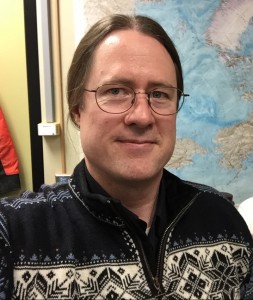 Dr. Seth Danielson is a Research Assistant Professor and a physical oceanographer with the School of Fisheries and Ocean Sciences at the University of Alaska Fairbanks. His research is focused on continental shelf processes of Alaska’s marginal seas through analysis of observational data and both highly idealized and realistic numerical model integrations. He seeks a better mechanistic understanding of the controls that modulate the circulation, temperature, and salinity fields over the Alaskan continental shelves. Ongoing studies include long-term monitoring at a moored ecosystem observatory in the northeast Chukchi Sea, at Gulf of Alaska oceanographic station GAK1, along the Gulf of Alaska Seward Line and in Glacier Bay National Park and Preserve. Process studies involve the analysis and interpretation of shipboard underway and station data, moored time series, satellite-tracked drifter records, and numerical model results from the Gulf of Alaska, the Bering Sea, the Chukchi Sea and the Beaufort Sea. These investigations inform ecosystem assessments, climate studies, fisheries management, and oil spill response planning efforts. Other efforts include the assembly of better bathymetric digital elevation models in the western Arctic and North Pacific, and development of a community-based ocean observation network that extends along Alaskan and Canadian North Pacific and Arctic coastlines.
Dr. Seth Danielson is a Research Assistant Professor and a physical oceanographer with the School of Fisheries and Ocean Sciences at the University of Alaska Fairbanks. His research is focused on continental shelf processes of Alaska’s marginal seas through analysis of observational data and both highly idealized and realistic numerical model integrations. He seeks a better mechanistic understanding of the controls that modulate the circulation, temperature, and salinity fields over the Alaskan continental shelves. Ongoing studies include long-term monitoring at a moored ecosystem observatory in the northeast Chukchi Sea, at Gulf of Alaska oceanographic station GAK1, along the Gulf of Alaska Seward Line and in Glacier Bay National Park and Preserve. Process studies involve the analysis and interpretation of shipboard underway and station data, moored time series, satellite-tracked drifter records, and numerical model results from the Gulf of Alaska, the Bering Sea, the Chukchi Sea and the Beaufort Sea. These investigations inform ecosystem assessments, climate studies, fisheries management, and oil spill response planning efforts. Other efforts include the assembly of better bathymetric digital elevation models in the western Arctic and North Pacific, and development of a community-based ocean observation network that extends along Alaskan and Canadian North Pacific and Arctic coastlines.
Jacqueline Grebmeier, Ph.D.
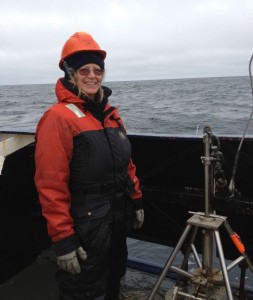 Dr. Jacqueline Grebmeier is Research Professor and a biological oceanographer at the University of Maryland Center for Environmental Science. She earned a Bachelor of Arts in Zoology from the University of California, Davis in 1977 and went on to receive Masters Degrees in Biology from Stanford University in 1979, and in Marine Affairs from the University of Washington in 1983, specializing in applications of Arctic science to Arctic policy. Dr. Grebmeier earned a Ph.D. in Biological Oceanography from the University of Alaska Fairbanks in 1987. She has played a leadership role in coordinating and promoting national and international arctic research. She recently completed her service as the U.S. delegate to, and a vice-president of the International Arctic Science Committee, and as a member of the U.S. Polar Research Board of the National Academies, and she also served formerly as a Commissioner of the U.S. Arctic Research Commission following appointment by President Clinton. She has contributed to other coordinated international and national science planning efforts including service on the steering committee for U.S. efforts during the International Polar Year. Over the last thirty years she has participated in over 45 oceanographic expeditions on both US and foreign vessels, many as Chief Scientist, and she was the overall project lead scientist for the U.S. Western Arctic Shelf-Basin Interactions project, which was one of the largest U.S. funded global change studies undertaken in the Arctic. Her research includes studies of pelagic-benthic coupling in marine systems, benthic carbon cycling, benthic faunal population structure, and polar ecosystem health, and she has published approximately 100 peer-reviewed scientific papers and she has also served as editor of several books and journal special issues. Her research is focused on understanding how arctic marine ecosystems respond to environmental change, particularly efforts to illuminate the importance of benthic biological systems.
Dr. Jacqueline Grebmeier is Research Professor and a biological oceanographer at the University of Maryland Center for Environmental Science. She earned a Bachelor of Arts in Zoology from the University of California, Davis in 1977 and went on to receive Masters Degrees in Biology from Stanford University in 1979, and in Marine Affairs from the University of Washington in 1983, specializing in applications of Arctic science to Arctic policy. Dr. Grebmeier earned a Ph.D. in Biological Oceanography from the University of Alaska Fairbanks in 1987. She has played a leadership role in coordinating and promoting national and international arctic research. She recently completed her service as the U.S. delegate to, and a vice-president of the International Arctic Science Committee, and as a member of the U.S. Polar Research Board of the National Academies, and she also served formerly as a Commissioner of the U.S. Arctic Research Commission following appointment by President Clinton. She has contributed to other coordinated international and national science planning efforts including service on the steering committee for U.S. efforts during the International Polar Year. Over the last thirty years she has participated in over 45 oceanographic expeditions on both US and foreign vessels, many as Chief Scientist, and she was the overall project lead scientist for the U.S. Western Arctic Shelf-Basin Interactions project, which was one of the largest U.S. funded global change studies undertaken in the Arctic. Her research includes studies of pelagic-benthic coupling in marine systems, benthic carbon cycling, benthic faunal population structure, and polar ecosystem health, and she has published approximately 100 peer-reviewed scientific papers and she has also served as editor of several books and journal special issues. Her research is focused on understanding how arctic marine ecosystems respond to environmental change, particularly efforts to illuminate the importance of benthic biological systems.
Russ Hopcroft, Ph.D.
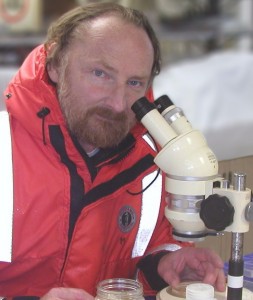 Dr. Russ Hopcroft is a Professor at the University of Alaska’s Institute of Marine Science in Fairbanks. He grew up fascinated by aquatic life (and Jacques Cousteau specials), and pursued this fascination throughout his education. Dr. Hopcroft received his Masters degree in 1988, and his Ph.D. in 1997 from the University of Guelph, Ontario, Canada. From 1997 to 1999, he was a Post-doctoral Fellow at the Monterey Bay Aquarium Research Institute (MBARI), where he was heavily involved in the use of ROVs, and traditional oceanographic surveys, to study the oceans. He pursues a broad array of research interests, concentrating on the composition, production and energy flow of the planktonic trophic levels that ultimately shape the structure of all marine communities. Since joining UAF in 2000, he focus has shifted to Arctic and subarctic planktonic communities with emphasis on Alaskan waters. Much of his lab’s activity focuses on understanding the linkage between climate and zooplankton communities. In addition to traditional emphasis on crustaceans zooplankton (copepods and euphausiids), he also works on the broad array of soft-bodied zooplankton groups such as jellyfish, the larvacean pelagic tunicates, and most pelagic snails (pteropods and heteropods). He has served on the steering committee of several Census of Marine Life projects: the Arctic Ocean Biodiversity (ArcOD) project, the Census of Antarctic marine Life (CAML), and the global Census of Marine Zooplankton (CMarZ). While he has published over 90 papers, he is also recognized for his images of live zooplankton that are widely distributed in the media and on the web.
Dr. Russ Hopcroft is a Professor at the University of Alaska’s Institute of Marine Science in Fairbanks. He grew up fascinated by aquatic life (and Jacques Cousteau specials), and pursued this fascination throughout his education. Dr. Hopcroft received his Masters degree in 1988, and his Ph.D. in 1997 from the University of Guelph, Ontario, Canada. From 1997 to 1999, he was a Post-doctoral Fellow at the Monterey Bay Aquarium Research Institute (MBARI), where he was heavily involved in the use of ROVs, and traditional oceanographic surveys, to study the oceans. He pursues a broad array of research interests, concentrating on the composition, production and energy flow of the planktonic trophic levels that ultimately shape the structure of all marine communities. Since joining UAF in 2000, he focus has shifted to Arctic and subarctic planktonic communities with emphasis on Alaskan waters. Much of his lab’s activity focuses on understanding the linkage between climate and zooplankton communities. In addition to traditional emphasis on crustaceans zooplankton (copepods and euphausiids), he also works on the broad array of soft-bodied zooplankton groups such as jellyfish, the larvacean pelagic tunicates, and most pelagic snails (pteropods and heteropods). He has served on the steering committee of several Census of Marine Life projects: the Arctic Ocean Biodiversity (ArcOD) project, the Census of Antarctic marine Life (CAML), and the global Census of Marine Zooplankton (CMarZ). While he has published over 90 papers, he is also recognized for his images of live zooplankton that are widely distributed in the media and on the web.
Kathy Kuletz, Ph.D.
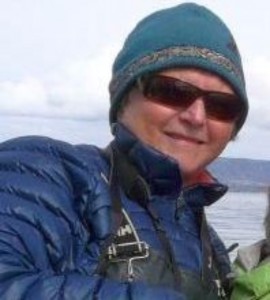 The Principal Investigator for the Seabird Component of AMBON is Dr. Kathy Kuletz, who is the Seabird Coordinator for Migratory Bird Management, U.S. Fish and Wildlife Service in Anchorage, Alaska. She has been involved in research and monitoring of seabirds in Alaska for over 30 years, including studies on distribution, abundance, habitat use, diet, productivity, and seabird-prey interactions. She has worked in all of Alaska’s oceans and her projects have contributed over 200,000 km of survey effort to the North Pacific Pelagic Seabird Database. Her collaborative projects have included SOAR, Arctic Eis, BSIERP, and GulfWatch Alaska. Kathy earned her B.Sc degree at California Polytechnic State University, her M.Sc. at University of California, Irvine, and her Ph.D. at University of Victoria, British Columbia. Kathy is current Chair of the Pacific Seabird Group, an Associate Editor of the journal Marine Ornithology, and a U.S. representative for the Circumpolar Seabird Expert Group of CAFF.
The Principal Investigator for the Seabird Component of AMBON is Dr. Kathy Kuletz, who is the Seabird Coordinator for Migratory Bird Management, U.S. Fish and Wildlife Service in Anchorage, Alaska. She has been involved in research and monitoring of seabirds in Alaska for over 30 years, including studies on distribution, abundance, habitat use, diet, productivity, and seabird-prey interactions. She has worked in all of Alaska’s oceans and her projects have contributed over 200,000 km of survey effort to the North Pacific Pelagic Seabird Database. Her collaborative projects have included SOAR, Arctic Eis, BSIERP, and GulfWatch Alaska. Kathy earned her B.Sc degree at California Polytechnic State University, her M.Sc. at University of California, Irvine, and her Ph.D. at University of Victoria, British Columbia. Kathy is current Chair of the Pacific Seabird Group, an Associate Editor of the journal Marine Ornithology, and a U.S. representative for the Circumpolar Seabird Expert Group of CAFF.
Sue Moore, Ph.D.
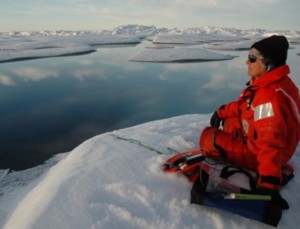 Dr. Sue Moore is a senior scientist with the U.S. NOAA Fisheries, Office of Science and Technology and an Affiliate Professor at the University of Washington, in Biology and the School of Aquatic & Fishery Sciences. She has 35 years of research experience focused on the ecology, bioacoustics, and natural history of whales and dolphins, with most of her work directed toward cetaceans in the Pacific Arctic region. Sue received a BA in Biology from the University of California, San Diego, a MS in Biology from San Diego State University, and a PhD in Biological Oceanography from Scripps Institution of Oceanography, with a dissertation entitled Cetacean Habitats in the Alaskan Arctic. Sue has served the Director of the NOAA National Marine Mammal Laboratory, as Chair of the Environmental Concerns Working Group of the International Whaling Commission Scientific Committee and currently serves on various science advisory committees including the U. S. Marine Mammal Commission.
Dr. Sue Moore is a senior scientist with the U.S. NOAA Fisheries, Office of Science and Technology and an Affiliate Professor at the University of Washington, in Biology and the School of Aquatic & Fishery Sciences. She has 35 years of research experience focused on the ecology, bioacoustics, and natural history of whales and dolphins, with most of her work directed toward cetaceans in the Pacific Arctic region. Sue received a BA in Biology from the University of California, San Diego, a MS in Biology from San Diego State University, and a PhD in Biological Oceanography from Scripps Institution of Oceanography, with a dissertation entitled Cetacean Habitats in the Alaskan Arctic. Sue has served the Director of the NOAA National Marine Mammal Laboratory, as Chair of the Environmental Concerns Working Group of the International Whaling Commission Scientific Committee and currently serves on various science advisory committees including the U. S. Marine Mammal Commission.
Franz Mueter, Ph.D.
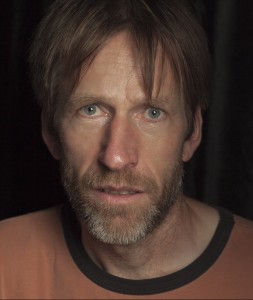 Dr. Franz Mueter is an Associate Professor of Fisheries at the University of Alaska Fairbanks, where he conducts research, advises graduate students, and teaches courses in quantitative ecology and fisheries oceanography. He has over 20 years experience working as a fisheries oceanographer, statistician, and consultant on fisheries issues in the Bering Sea, Chukchi Sea, and other marine ecosystems around the Arctic. His research has focused on the influence of climate variability and climate change on the recruitment and spatial dynamics of marine and anadromous fish and shellfish populations. Dr. Mueter has participated in numerous oceanographic and fisheries surveys in Alaska’s marine waters, including its arctic seas. He is currently lead investigator on three Arctic projects, the Arctic Ecosystem Integrated Survey (Arctic EIS), a multi-agency, interdisciplinary research project in the northern Bering Sea and Chukchi Sea; a Japan-Norway-US collaboration on the resilience and adaptive capacity of arctic marine ecosystems, and a biophysical modeling project to investigate the early life history of Arctic Gadids. He also advises the North Pacific Fishery Management Council as a member of the Council’s Scientific and Statistical Committee, serves as co-chair of the Ecosystem Studies of the Subarctic Seas (ESSAS) program and is a member of ‘Climate Change Effects on Marine Ecosystems’ (S-CCME), a section of the North Pacific Marine Science Organization (PICES).
Dr. Franz Mueter is an Associate Professor of Fisheries at the University of Alaska Fairbanks, where he conducts research, advises graduate students, and teaches courses in quantitative ecology and fisheries oceanography. He has over 20 years experience working as a fisheries oceanographer, statistician, and consultant on fisheries issues in the Bering Sea, Chukchi Sea, and other marine ecosystems around the Arctic. His research has focused on the influence of climate variability and climate change on the recruitment and spatial dynamics of marine and anadromous fish and shellfish populations. Dr. Mueter has participated in numerous oceanographic and fisheries surveys in Alaska’s marine waters, including its arctic seas. He is currently lead investigator on three Arctic projects, the Arctic Ecosystem Integrated Survey (Arctic EIS), a multi-agency, interdisciplinary research project in the northern Bering Sea and Chukchi Sea; a Japan-Norway-US collaboration on the resilience and adaptive capacity of arctic marine ecosystems, and a biophysical modeling project to investigate the early life history of Arctic Gadids. He also advises the North Pacific Fishery Management Council as a member of the Council’s Scientific and Statistical Committee, serves as co-chair of the Ecosystem Studies of the Subarctic Seas (ESSAS) program and is a member of ‘Climate Change Effects on Marine Ecosystems’ (S-CCME), a section of the North Pacific Marine Science Organization (PICES).
Kate Stafford, Ph.D.
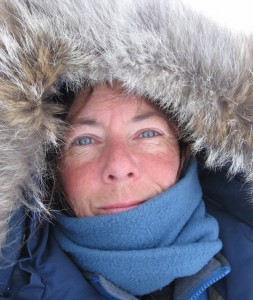 Dr Kate Stafford is a Principal Oceanographer at the Applied Physics Laboratory at the University of Washington in Seattle, WA, USA. She holds a Master’s degree in Wildlife Science and a PhD in Interdisciplinary Oceanography from Oregon State University. She has studied large whales throughout the world’s oceans with a focus on sound production and integration with habitat modeling. Her current research focus is on Arctic bioacoustics and how the changing climate is impacting the phenology of Arctic and sub-Arctic marine mammals at sub-Arctic-Arctic gateways.
Dr Kate Stafford is a Principal Oceanographer at the Applied Physics Laboratory at the University of Washington in Seattle, WA, USA. She holds a Master’s degree in Wildlife Science and a PhD in Interdisciplinary Oceanography from Oregon State University. She has studied large whales throughout the world’s oceans with a focus on sound production and integration with habitat modeling. Her current research focus is on Arctic bioacoustics and how the changing climate is impacting the phenology of Arctic and sub-Arctic marine mammals at sub-Arctic-Arctic gateways.
Research Associates
Dan Cushing, M.Sc.
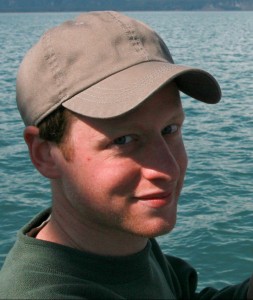 Dan Cushing joins the AMBON team as a seabird ecologist. With over a decade of field experience, he has worked in the Gulf of Alaska, the Bering Sea, and the Arctic. Dan has participated in studies of seabird distribution, abundance, habitat use, productivity, and diet, using approaches from at-sea surveys to bio-logging technologies. He earned a Master of Science degree in Wildlife Science from Oregon State University, where he studied long-term changes in the marine bird community of Prince William Sound, Alaska, using two decades of survey data collected by the U.S. Fish and Wildlife Service.
Dan Cushing joins the AMBON team as a seabird ecologist. With over a decade of field experience, he has worked in the Gulf of Alaska, the Bering Sea, and the Arctic. Dan has participated in studies of seabird distribution, abundance, habitat use, productivity, and diet, using approaches from at-sea surveys to bio-logging technologies. He earned a Master of Science degree in Wildlife Science from Oregon State University, where he studied long-term changes in the marine bird community of Prince William Sound, Alaska, using two decades of survey data collected by the U.S. Fish and Wildlife Service.
Lorena Edenfield, M.Sc.
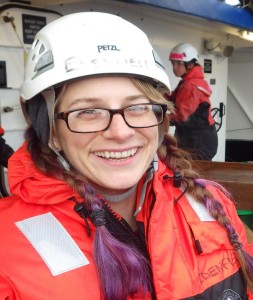 Lorena Edenfield is a fish ecologist on the AMBON team. She has over ten years of experience in the field, with much of that time spent in the Arctic marine environment studying distribution, habitat use, and diets of polar fish species. She completed a Master of Science at the University of Alaska Fairbanks, where she examined stock dynamics of two whitefish species.
Lorena Edenfield is a fish ecologist on the AMBON team. She has over ten years of experience in the field, with much of that time spent in the Arctic marine environment studying distribution, habitat use, and diets of polar fish species. She completed a Master of Science at the University of Alaska Fairbanks, where she examined stock dynamics of two whitefish species.
Ann-Christine Zinkann, M.Sc.
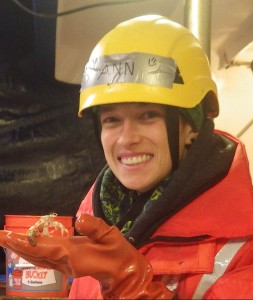 Ann-Christine Zinkann joins the AMBON team as a PhD student. She has a Master of Science degree in Biology from University of Hamburg, Germany, working on the ecology of holothurians along the Southern Polar Front using fatty acid and stable isotope measurements. She has participated in different research cruises working on food web analyses and identification of various benthic organisms in the Antarctic and Atlantic Ocean. Within AMBON, she will study the microbial influence on Chukchi Sea food webs.
Ann-Christine Zinkann joins the AMBON team as a PhD student. She has a Master of Science degree in Biology from University of Hamburg, Germany, working on the ecology of holothurians along the Southern Polar Front using fatty acid and stable isotope measurements. She has participated in different research cruises working on food web analyses and identification of various benthic organisms in the Antarctic and Atlantic Ocean. Within AMBON, she will study the microbial influence on Chukchi Sea food webs.
